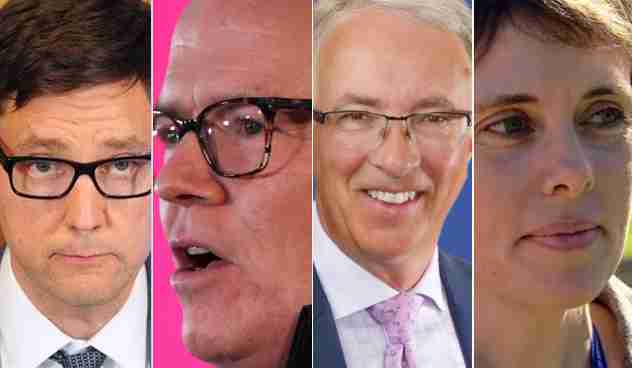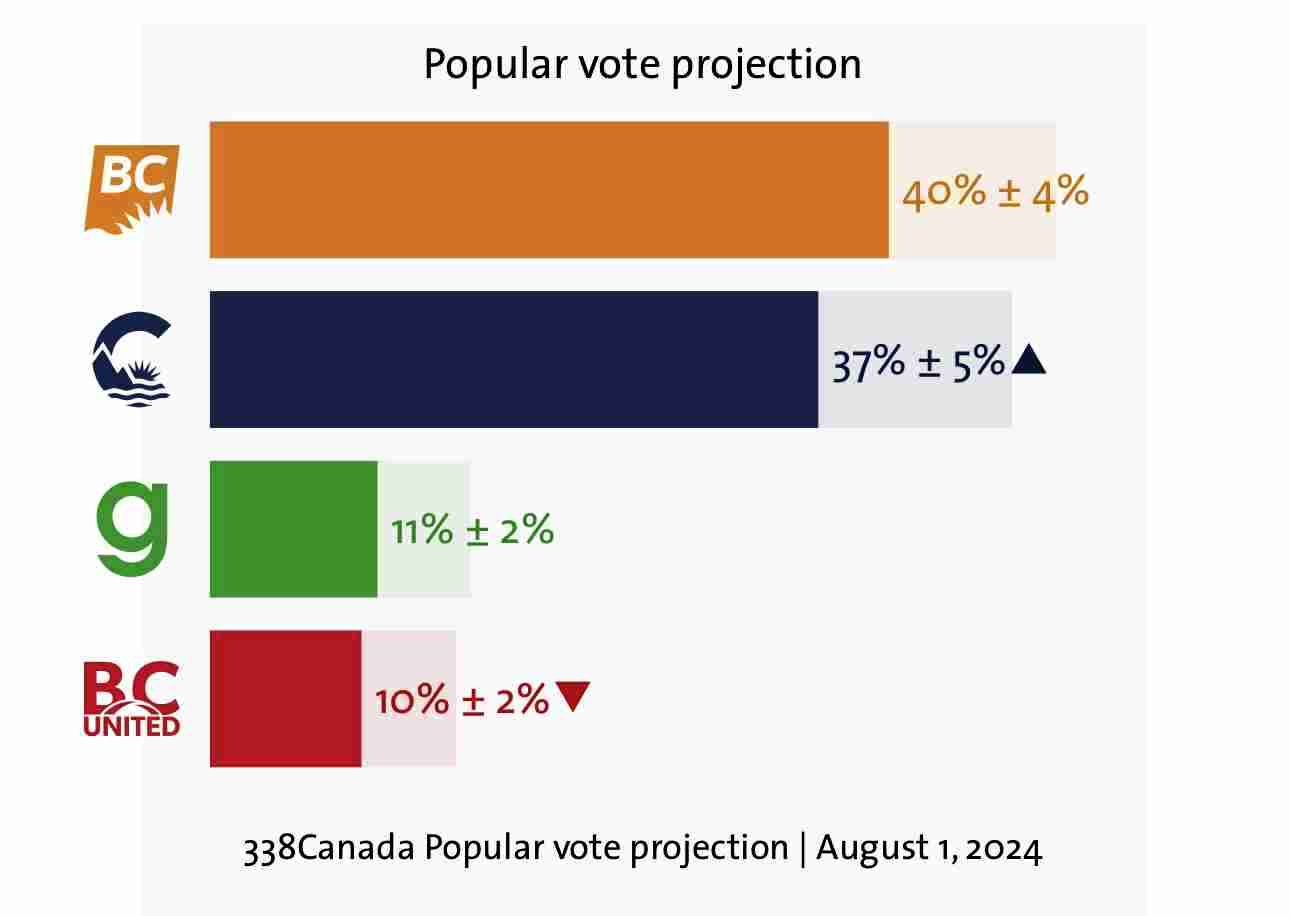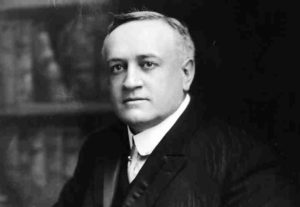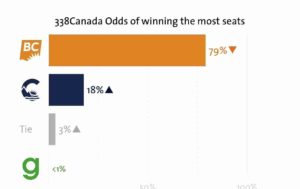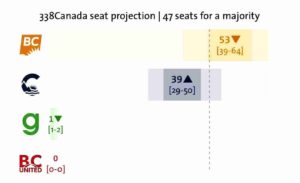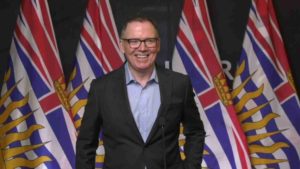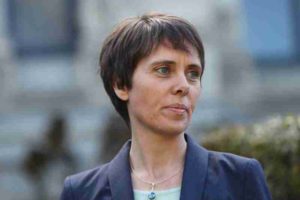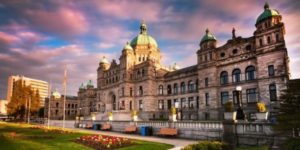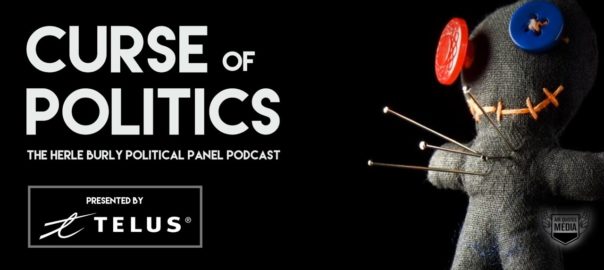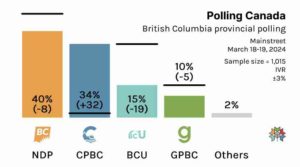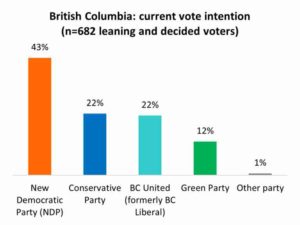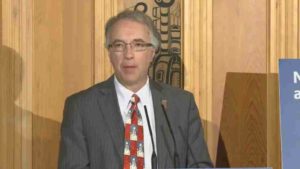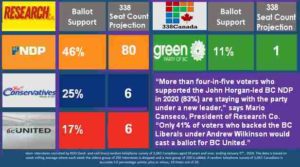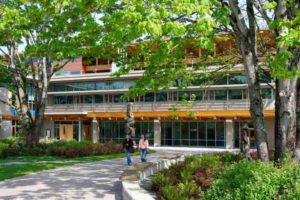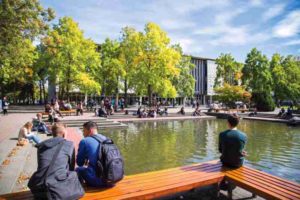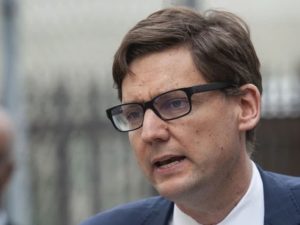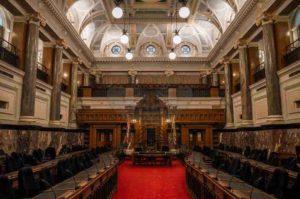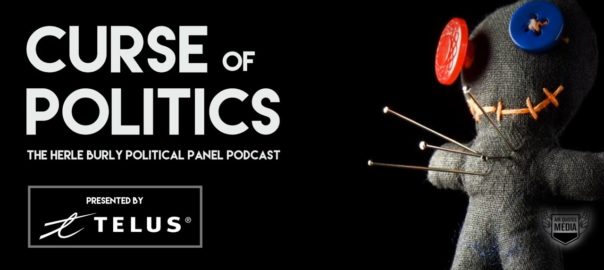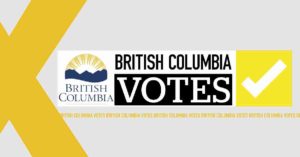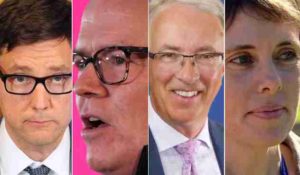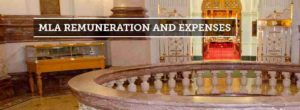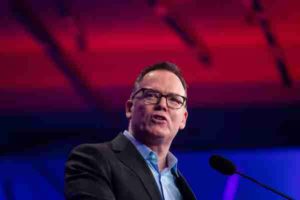
Mario Canseco’s Research Co poll released on January 31, 2024 places the BC NDP in first place
Premier David Eby’s second worst nightmare continues to unfold less than nine months before the 2024 British Columbia provincial election.
David Eby’s worst nightmare, of course, would be a repeat of the 2001 British Columbia election, when voters went to the polls, leaving only two seats from the NDP majority government that held power from 1991 through 2001. From 2001 through 2005, Joy McPhail & Jenny Kwan held the fort for B.C.’s New Democratic Party. Failure on that scale in 2024 would be unimaginably devastating.
In fact, there is a 2001 provincial election scenario that is, at present, unfolding in British Columbia, but it is a redux version of 2001, where the B.C. New Democratic Party has gained the confidence and largesse of British Columbia voters — seeming to give David Eby, and the BC NDP, an overwhelming majority — and where the renamed name B.C. Liberal Party — now inaptly named, B.C. United — look to be wiped out as a political force in our province, as they seem set to retain a mere six seats in the Legislature, in a house where 93 Members of the Legislature will sit.
Below, we’ll get to why the above scenario is Premier Eby’s 2nd worst nightmare.

Sonia Furstenau, Green Party of British Columbia leader, changing ridings before the 2024 election
On the last day of January 2024, Sonia Furstenau announced to the world that she is giving up on British Columbia politics, that she’s frustrated, fed up, worn out, is devastated that British Columbians have failed to support her tenure as leader of the Green Party of B.C., her integrity, her hard work and that of her Green Party colleague, Adam Olsen, and that a very centrist British Columbia electorate have thrown their support to a centrist British Columbia New Democratic Party under the leadership of David Eby, and cast her and her Green Party of British Columbia aside, and no longer want her in place to challenge a B.C. NDP government.
Did Sonia Furstenau voice the (fictional) concerns raised above, yesterday?
No. But she might as well have.

Beacon Hill Park, in Victoria
For, you see, Ms. Furstenau announced Wednesday that in the upcoming 2024 provincial election, rather than run again in the very safe Green Party supporting riding of Cowichan Valley, which she has held comfortably since 2016, instead Ms. Furstenau has chosen to devastate her Green Party supporters and the voting electorate in the Cowichan Valley, by announcing that come this autumn, she will run for office in the riding of Victoria-Beacon Hill — perhaps the safest NDP seat in the province — where she will challenge popular incumbent, Grace Lore, the current Minister of Children and Family Development in the David Eby government.
Note should be made that due to redistribution, Ms. Furstenau’s riding was divided in half, statistically giving the B.C. NDP a three-to-one advantage in the new ridings should she decide to run in either of the two new ridings. Pulling out of the political fray in the Cowichan Valley where she believes she cannot win, in favour of certain defeat in Victora-Beacon Hill, to VanRamblings seems to be a Hobson’s choice.
The above said, we wish Ms. Furstenau well in her political “retirement”, because most assuredly she will not win re-election come this Saturday, October 19th.
VanRamblings imagines after clearing her office she will take some time off, vacationing with her husband, perhaps returning in the spring to supply teach in her Cowichan Valley school district, where the administration will be over the moon to have her back in the fold, given the dire shortage of teachers in our province.

Vancouver Island University, entrance to the Cowichan campus administration office
Returning to teaching will also afford Ms. Furstenau to put in the time necessary to raise her pension to 80% of her annual average teachers’ salary of $90,000+ — whether she resumes her teaching career in the Cowichan Valley, or her “new home” in British Columbia’s capital city, where she would be closer to family.

The University of Victoria
Upon retirement at age 65, Ms. Furstenau will live in comfort financially, her home paid off, her teachers’ pension paying handsomely, supplemented by her Member of the Legislature / leader of the Green Party of BC provincial government pension. In addition, we also expect Vancouver Island University’s Cowichan campus, or should Ms. Furstenau remains in Victoria, the University of Victoria will want to bring her on staff as an instructor, to conduct an evening class or two.

If seeing his current 57-member strong New Democratic Party caucus reduced to two seats, as was the cataclysmic case in 2001, is the nightmare electoral scenario that David Eby fears most (an event unlikely to unfold), as we’ve written previously, securing 80 seats in the Legislature is certainly a nightmare electoral October 19th scenario that our Premier is hoping against hope will not unfold.
Why? As we’ve written previously, and will write again many times in the months to come: with 57 seats in the Legislature, including the Premier’s own Vancouver Point Grey riding seat, British Columbia’s beloved, soon-to-be-a-father for the third time (come June!), the Premier is perfectly content with 57 seats, a comfortable majority, just the right number of seats in the House to portion out Ministers, Parliamentary Secretary and House Speaker jobs, keep his caucus members busy, keeping them happy, as well, as this “extra work” affords each of the members of the NPD caucus additional salary to their $115,045.93 annual MLA compensation.
Much more than a 57-seat win, and the Premier faces undesired “trouble”, cuz there are no more additional, well-paying jobs for him to give out, leaving the “extra NDP MLAs” largely disenfranchised, and at loose ends with themselves.
Next thing you know, a rump group of B.C. Dippers will hive off from the provincial party to form their own — say, five member, environmentally-minded, opposed to LNG and fracking — B.C. political party, affording them the “extra monies” they heretofore had been denied. Politics, lemme tell ya, it ain’t for the faint of heart.

Kevin Falcon, leader of B.C. United, and decidedly on the right, B.C. Conservative leader, John Rustad
Politically in British Columbia, we seem to be living in a redux period.
In 1991, as “Premier” Rita Johnson — when disgraced Socred Premier Bill Vander Zalm resigned from office, the party chose Ms. Johnson as their leader, and Premier — championed the Social Credit party during that year’s provincial election, she not only lost government and 47 legislative seats, the Social Credit Party came in a distant third, the Social Credit Party finis / the Socreds dead, far from phoenix-like, after nearly 41 years in power, the party wiped out, and gone forever.
Once the cabal who run this province removed 1991’s Liberal leader, Gordon Wilson — who secured 17 seats for the B.C. Liberals, a revived B.C. Liberal party became the political standard-bearer for our province’s capitalist forces, an all-too-willing Gordon Campbell made leader, who in 2001 went on to become Premier.
Global BC’s Richard Zussman reports on B.C. United leader Kevin Falcon + the Greens’ Sonia Furstenau
Kevin Falcon, once a well-thought-of activist Minister in the Gordon Campbell government, will soon become the undertaker for the B.C. Liberal renamed B.C United Party, as this capitalist, free market party — whatever it’s name — will soon be but a fading memory on the political landscape of British Columbia provincial politics.

British Columbia’s Legislative Assembly
As for B.C. Conservative Party leader, John Rustad, as the far right gains power across the globe — in Canada, that would be federal Conservative Party leader, Pierre “The Destroyer” Poilievre (“Canada is broken. It’s all Justin Trudeau’s fault,”), as well as Alberta Premier Danielle Smith, Saskatchewan Premier Scott Moe, and New Brunswick Premier Blaine Higgs — steps gingerly into the political vacuum left by a mortally wounded B.C. United Party, Rustad would seem to be on track to become, perhaps, the Leader of Her Majesty’s official loyal Opposition, in the post election, post October next session of the British Columbia Legislature.
